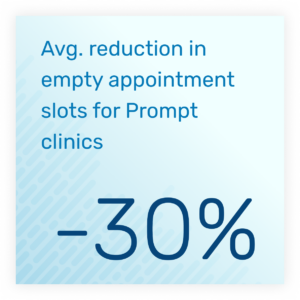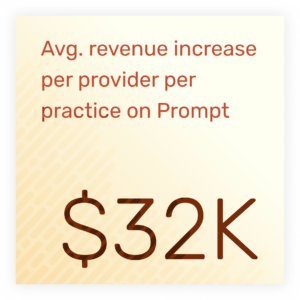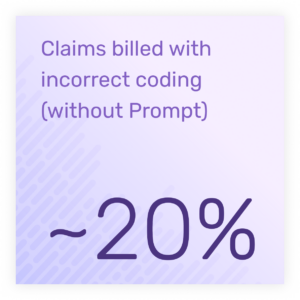See Prompt in action!


At Prompt, we're on a mission to improve patient outcomes at scale. To achieve this goal, we are strategically building features that use AI.
As a physical therapy practice owner, manager, clinician, or staff member, it’s unlikely that when you began your professional journey you were thinking about how “artificial intelligence” might help you in your work. But here we are: It’s 2023, and AI is all the buzz.
What was once a cumbersome, manual endeavor plagued with inefficiencies (starting and growing a practice) can now be increasingly less so with the help of technology. And, guess what? Prompt’s physical therapy software utilizes AI to assist humans dedicated to helping others. Here we’ll dive into how we’re using this technology to help rehab practices, and hopefully clear up some confusion surrounding what this AI magic actually is.
What does the techie buzz term even mean, exactly? McKinsey & Company offers up some definitions and supporting context in this article. TL;DR:
“AI is a machine’s ability to perform the cognitive functions we associate with human minds, such as perceiving, reasoning, learning, interacting with an environment, problem solving, and even exercising creativity.”
“Applied AI—simply, artificial intelligence applied to real-world problems—has serious implications for the business world. By using artificial intelligence, companies have the potential to make business more efficient and profitable.”
What does this mean for your very human-operated practice, though?
At Prompt, we’re on a mission to improve patient outcomes at scale. To achieve this goal, we are strategically building features that use AI to relieve clinic staff from manual tasks that have historically shifted focus away from human interaction and toward excessive data entry and analysis. Every part of our platform is intended to save you from “busy” work so you can do more meaningful work. To that end, we’ve incorporated AI in ways that speed up operations that take extensive time when done manually so that your efforts can be saved for the parts that need human attention. Think of it as fast-forwarding through the tedious tasks so that you can prioritize those that impact patient experience and practice growth–an efficiency engine, if you will.
“Our goal is to automate as many tasks in a practice that don’t require direct human intervention as possible. That enables your team to spend more time focusing on your patients, leading to better outcomes and a better patient experience,” explains Adam Baliatico, co-founder of Prompt.
“Our goal is to automate as many tasks in a practice that don’t require direct human intervention as possible. That enables your team to spend more time focusing on your patients, leading to better outcomes and a better patient experience,” explains Adam Baliatico, co-founder of Prompt.
Below, you’ll find descriptions of Prompt features that currently leverage AI. Each will give you a better understanding of how they work to make your job easier without taking decision-making power away from your staff.
A traditional approach to keeping a full schedule can be extremely time-consuming. It requires managing a manual waitlist, keeping track of under-scheduled patients, and calling patient after patient in an attempt to fill appointments.
Using Prompt’s schedule filler, built on top of AI, practices can achieve full (or nearly full) schedules as a norm, not the exception. It automatically matches empty appointment slots with under-scheduled patients that want to come to therapy at that time. Plus, you have full power to approve the appointment if that’s your preference.

Prompt helps reduce empty appointment slots by 30% on average.
Traditionally managing and tracking plan of care compliance is a manual beast. Not to mention the effort involved in reminding patients to book according to their POC.
Using Prompt’s automated plan of care compliance tool, practices can reduce drop-offs and ensure patients comply with their therapist-prescribed plan of care. Our AI engine analyzes patient plans of care compared to their scheduling and determines when there are needs for additional visits.
You’re able to automatically notify under-scheduled patients and enable online scheduling. Again, you have full power to approve the appointment if that’s your preference.

Claim compliance expertise isn’t easy to come by. Traditionally, practices have needed to invest heavily in working denials caused by improper coding and documentation.
Using Prompt’s claim scrubbing and automated coding compliance tools reduces costly denials and increases compliance. Our one-of-a-kind advanced claims engine uses AI to analyze and identify proper and improper coding to prevent denials before they happen.
It alerts staff to fix issues before claims go out. Prompt becomes your resident compliance expert and frees up your billers to focus on problem claims.

Prompt’s claim validation engine prevents over 80% of potential denials.
Historically, practices have relied heavily on manually reviewing and sorting claims to be worked. It’s cumbersome, time-consuming, and requires human eyes on every single claim.
Using Prompt’s automated claim posting engine, billers are saved that effort.
This AI-powered engine proactively identifies clean claims, posts all relevant cash and patient responsibility, submits secondary claims when necessary, and flags both full and partial denials for billers to work. It handles 90-95% of the work, leaving you to focus on the 5-10% that have issues.

Prompt clinics get paid in under 17 days on average.
CPT code selection can be an intimidating task for therapists. One of Prompt’s Integration Partners, PredictionHealth, analyzed the primary CPT codes billed by clinicians: therapeutic exercise (97110), therapeutic activities (97530), and neuromuscular reeducation (97112).
They found that the incorrect code was selected around 20% of the time. Hello, improper reimbursements and increased audit risks.
Practice owners on Prompt can leverage PredictionHealth to assist their therapists in selecting the proper coding. It uses AI models to analyze coding using a feature called CPT Insights to identify both revenue opportunities (undercoding) and compliance risks (overcoding).

Learn more about how PredictionHealth optimizes coding selection here.
Without Prompt, around 20% of all claims are billed with incorrect coding.
Sound too good to be true? It’s not. Practices using Prompt enjoy the benefits of AI working in the background to help them spend the least amount of time on Prompt as possible, all while still maintaining complete control of their clinics. Our dedication to better outcomes starts with enabling you to focus on meaningful work: treating patients through to positive outcomes.
The AI-powered features described above serve three purposes
Want to learn more about how Prompt can help your practice grow? We welcome you to schedule a demo with a human member of the team, who will be happy to answer your questions without consulting an bot. 😉
Help your practice grow
From intake to insights, Prompt is the all-in-one platform you need